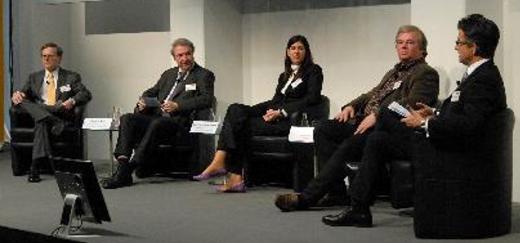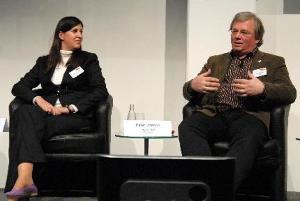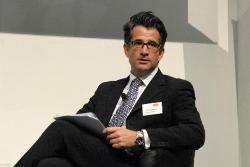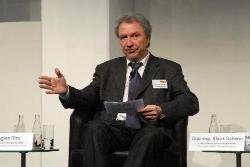3rd ITB Hospitality Day - Panel on cost-saving hotel technology
 |
Berlin (April 11, 2008). Nobody knows what the hotel and hotel room of the future will look like. However, attentiveness to the desires of guests has increased, and the same goes for the drastically rising energy costs forcing providers like hotel investors and operators to act. The future focus is clearly smart, hotel-integrated technology that provides an added value for guests, and building management whose challenge is no longer construction but handling. The discussion on how " industry and research can help to build an efficient hotel" attracted almost 300 guests at the 3rd ITB Hospitality Day during the ITB Berlin 2008. All in all, 1,100 visitors came to the five panel discussions at the hotel conference whose content was organised by hospitalityInside.com.
As CEO of the HTNG (Hotel Technology Next Generation) technology think tank in Chicago, host Douglas Rice (very left in the photo above) described the impulses he noticed in the meetings with hoteliers and the industry: accordingly, the guests` expectations of the technological support inside hotels (e.g. e-mail, messaging) are rising, while more and more employees easily coping with these new technologies join the hotel staff. At the same time, expectations of investors are changing as well. "We need to find a practical balance between costs and benefits," said Rice.
 |
| Vanessa Borkmann and Peter Joehnk |
As regards the hotels, the biggest practical problem is splitting of processes inside the hotels, criticised Klaus Scherer, Managing Director of Inhaus2 (Integrated house systems) at Fraunhofer-Gesellschaft in Duisburg. This institute is currently erecting a future lab for discovering the perfect hotel (room). Linder Hotels in Duesseldorf is the hotel partner of the project. "We`ve spread the servers all over the hotel;" said Scherer. There was no bundled process control, which then turned into inefficiency and higher costs. "There is no all-inclusive solution for these problems, but the answer of our innovation centre is: you can bundle the entire technology of the building - the telephone systems, computers, security, light, and multimedia - on a single server. It is able to integrate all functionalities and act."
In this way, hotel rooms are becoming a technology central control in which guests watch TV, listen to the radio or order the room service via a "media centre". Heating and light can be controlled over the same device. "This data centre will be a centre of information for and about the hotel room," said the researcher briefly describing the new dimension. In his "flexible lab" at Inhaus2, his colleague Vanessa Borkmann does not only move walls and furniture on a test basis, but she also varies technology. "The room of the future has already been born," says Borkmann, as we`re watching young people."
 |
| Otto Lindner |
Peter Joehnk, Interior Designer and Managing Director of JOI Design in Hamburg, agreed as a father of two young adults: "They go to bed with their ipod and are totally multimedia-oriented!", he confirms mentioning his own professional experience: "All this should be kept in mind for the future, but we didn`t have a single project into which such considerations were integrated." In addition, he sees only hesitant investors who were not ready to decide in favour of a young design.
Otto Lindner admonished: "We hoteliers actually sell rooms, and the technology discussion increases the pressure on us in an enormous way, as it is not our core competence. That is why we need to be flexible. And create the infrastructure." As new cabling costs a lot of money in existing hotels, he demands open systems that can be expanded over the next 20 years. According to Douglas Rice, the fact that normally two to four employees deal with the network hotel showed how serious this issue is taken by hotel chains. The costs for the physical infrastructure are going down in the meantime, said Scherer encouragingly; however, a big technology network created new costs for the management of these systems. "They have to invest all their efforts at all service levels. After all, playing a video cannot be interrupted by a phone call."
 |
| Klaus Scherer |
Peter Joehnk queried the costs involved. When architects and interior designers design cable ducts aiming at hiding cabling, this had a great influence on costs. "Who assumes these costs? Hoteliers/operators or investors?" asked Joehnk and conjectured: for operators this pool of costs was probably of major importance compared to profits.
According to Douglas Rice of HTNG, there were several different business models in practice. Owners were definitely willing to pay for infrastructure. But there were more and more service companies operating the network based on monthly charges. In this way, operators can calculate with a fixed budget.
Anyway, travellers will not be willing to accept high rates for technology in hotels, as they are particularly spoilt by cheap flat fees for the telephone and the Internet. Therefore, Otto Lindner is already concentrating on providing added value offering multimedia packages. But in the long run, Internet will have to be offered for free in hotels. "With the new systems, we would like to offer phone calls for free within the next few months, even for international guests," announced Lindner. "This is a competitive edge in marketing, even if we won`t be earning money with technology or communication." The participants agreed that a "phone free" room could be tolerated in 2 and 3-star hotels, but would be perceived as a restriction of service in hotels of higher classification.
Douglas Rice then focused on the field of energy, which has become the biggest cost driver with 16% in certain hotels even today. Vanessa Borkmann’s suggestion of heating bathrooms only in the morning and evening did not find much support among the participants compared to the proposition to allocate rooms on one floor after the other in cases of low occupancy "rendering the other floors cold". Today, glass is as thick as walls, shower heads reduce water consumption when adding air, and light could be reduced to 175 watt in bedrooms just as in Switzerland. And last but not least, the hotelier among the participants made mention of the employees: a first step towards cost reduction was already made by making employees sensitive to "waste of energy". "It would be great if technology could help us save costs," summarised Lindner. "Then we would have more time for service again." / map
To print this article you have to be registered and logged in for newsletter, visitor or subscription.





